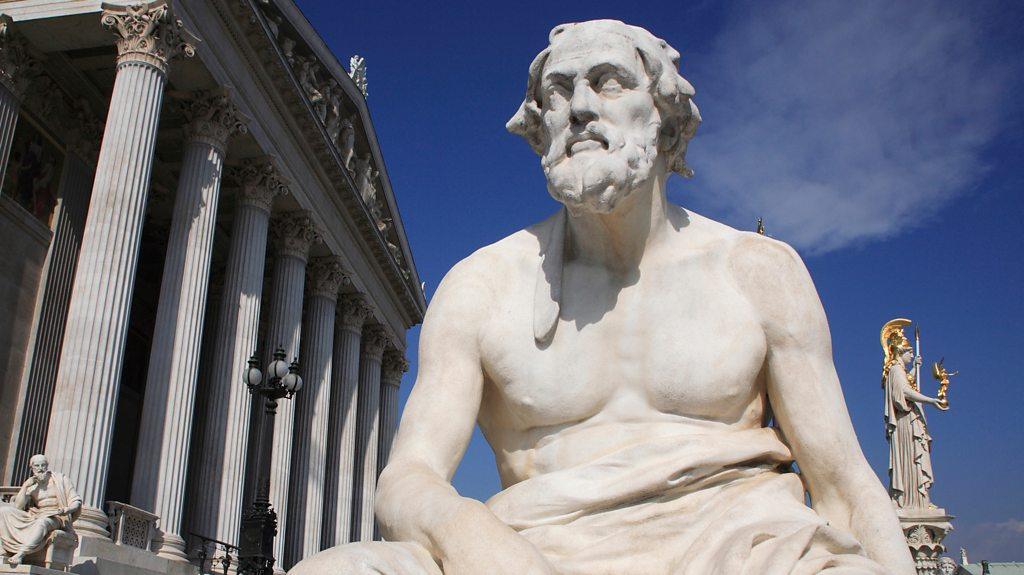The night the US bombed a Chinese embassy
- Published
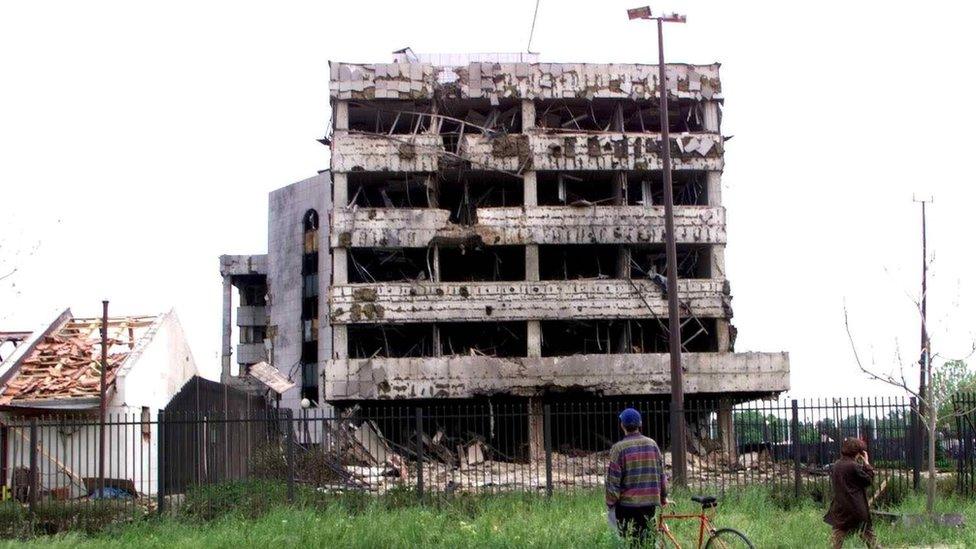

It was close to midnight and Vlada, a Serbian engineer, was speeding towards his apartment in Belgrade. He had taken his 20-year-old son out that evening but bombs had started to fall across the Yugoslav capital. The power grid was down and he wanted to get home.
Nato, the world's most powerful military alliance, had been pummelling Yugoslavia from the skies since late March to try to bring a halt to atrocities committed by President Slobodan Milosevic's forces against ethnic Albanians in the province of Kosovo. It was now 7 May 1999 and the US-dominated air campaign was only growing more intense.
Vlada's family had spent many nights in recent weeks huddled with others in the basement of their apartment building as air raid sirens blared outside, praying that an errant missile wouldn't strike their homes.
They were lucky, some thought, to live just next to the Chinese embassy - an important diplomatic mission. Being there would surely protect them.
But as Vlada and his son approached the glass doors of their building in the dark, US B-2 stealth warplanes were in the skies above Belgrade. They were locked-on to the precise co-ordinates of a target selected and cleared by the CIA. All Vlada heard at first was the whoosh of an incoming missile. There was no time to move. The doors shattered, spraying glass at them.
"The force of the first bomb lifted us off the ground and we fell… Then one after the other [more bombs landed] - bam, bam, bam. All the shutters on the block were ripped off by the blast, it broke all the windows."
They were terrified but uninjured. All five bombs had hit the embassy, 100 metres away.
The US and Nato were already facing scrutiny over mounting civilian casualties in a bombing campaign conducted without UN authorisation and fiercely opposed by China and Russia. They had now attacked a symbol of Chinese sovereignty in the heart of the Balkans.


Embassy workers escaped through windows after the strikes

Across town, Shen Hong, a well-connected Chinese businessman, was getting word that the embassy had been hit. He refused to believe it. Just a few days earlier, his father had phoned from Shanghai and joked that his son should park his new Mercedes at the diplomatic compound to keep it safe.
"I called a policeman who I knew and he said, 'Yes, Shen, it's really hit'. He said come right away, so then I knew it was real, it was true."
He arrived to a scene of chaos. The embassy was burning; workers covered in blood and dust were climbing out of windows to escape. Politicians close to Milosevic - who had been charged two weeks earlier with crimes against humanity by an international tribunal - were already arriving to denounce the bombing as the latest example of Nato barbarity.
"We could not go inside. There was a lot of smoke, there wasn't any electricity and we couldn't see anything. It was horrible," said Shen.

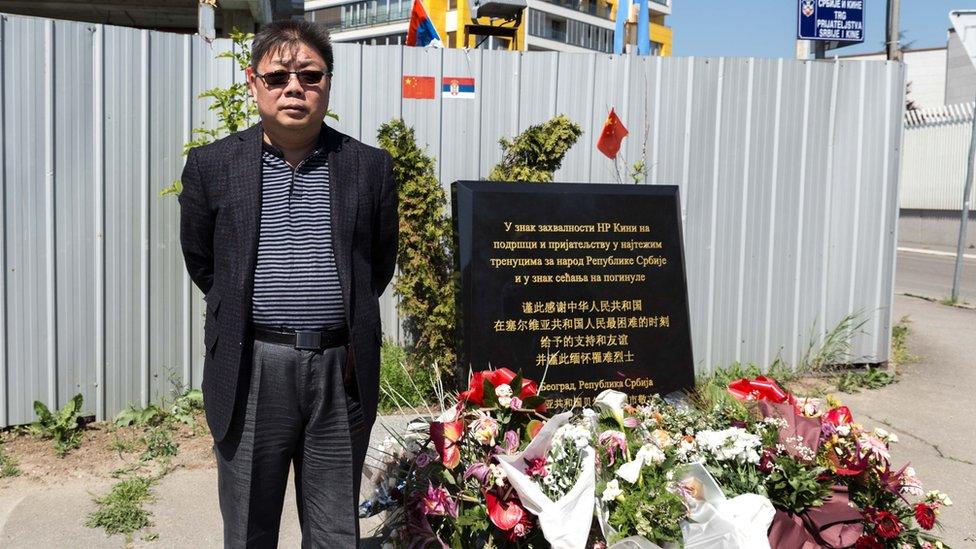
Shen Hong lost close friends in the bombing

He spotted the cultural attaché, a man he knew, who had knotted together curtains to get out of a first-floor window. "We didn't see that he was injured and he didn't notice it either. It was only when I shook his hand that I realised my hands were covered in blood. I told him 'you're injured, you're injured!' - but when he saw this he passed out."
The next day Shen would learn that two close friends - newlywed journalists Xu Xinghu, 31, and Zhu Ying, 27 - had been killed by a bomb that hit the sleeping quarters of the embassy. Their bodies were found under a collapsed wall.
The pair had worked for the Guangming (Enlightenment) Daily - a communist party newspaper. Xu, a language graduate who spoke fluent Serbian, had chronicled life in Belgrade during the bombings in a series of special reports called "Living Under Gunfire".

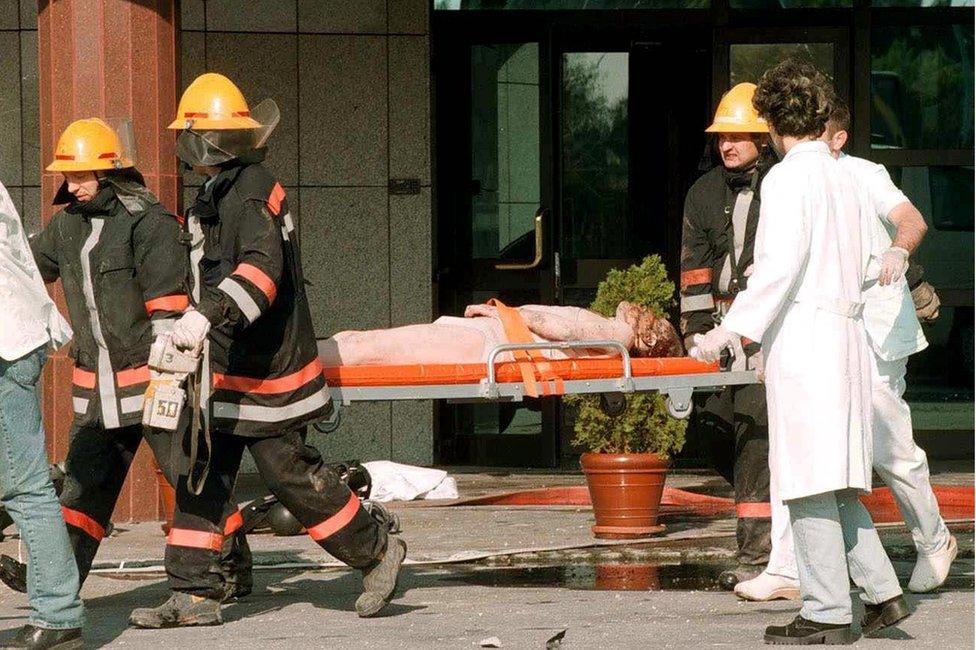

Zhu Ying worked as an art editor in the paper's advertising department. Her mother collapsed with grief and was sent to hospital when she learned of her daughter's death so Zhu's father travelled alone to Belgrade to see the body.
A third journalist, 48-year-old Shao Yunhuan, of the Xinhua news agency, also died. Her husband, Cao Rongfei, was blinded. The embassy's military attaché, who is believed to have run an intelligence cell from the building, was sent back to China in a coma. In total, three people were killed and at least 20 injured.
For Shen, this was an act of war. The next day he led a protest through the streets of Belgrade carrying a sign reading "NATO: Nazi American Terrorist Organisation"
It was a sign of what was to come.
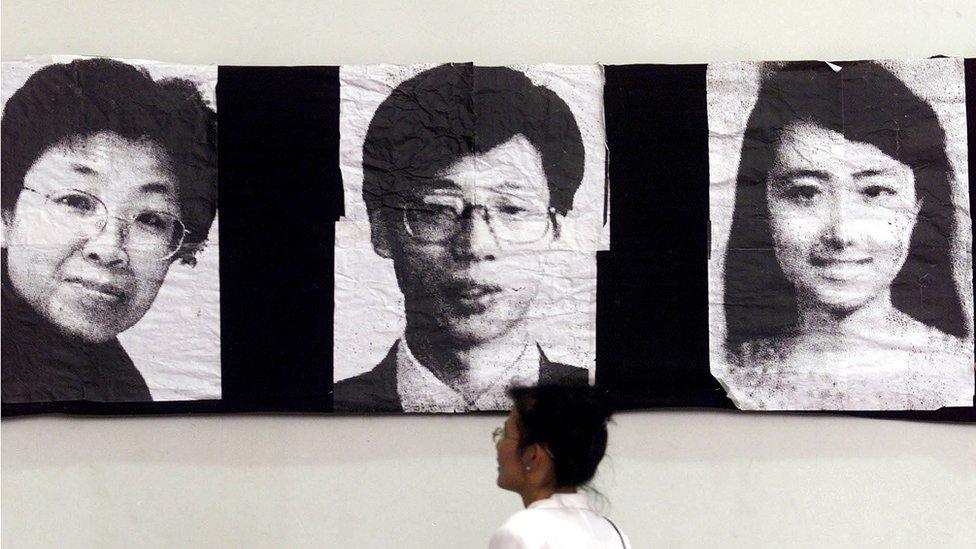
Three journalists were killed in the embassy

Within hours of the bombing, two competing narratives began to emerge. They would harden over the coming months and form the basis of how the incident - which continues to linger over the US-China relationship - remains debated today.
The bombing fuelled speculation, and there was no shortage of unanswered questions and missing pieces that were put together by some to imply a grand conspiracy. Intrigue continued to hang over the incident and, months afterwards, two respected European newspapers suggested the strikes were by design.
But, as former Nato officials point out, in 20 years no clear evidence has come to light proving what almost all of China believes and America strenuously denies: that it was deliberate.
In those first hours after the bombs fell, the US and Nato wasted no time to announce that it was an accident. China's representative at the UN, meanwhile, denounced a "crime of war" and a "barbarian act".
In Brussels, Jamie Shea - the British Nato spokesman who became the public face of the war - was woken up in the middle of the night and told he would have to face the world's press in the morning. The information available in those early hours was thin but he would give one of the first explanations of what had happened, along with an apology. The warplanes, he said from the briefing podium, had "struck the wrong building".
"It's like a train accident or a car crash - you know what has happened but what you don't know is why it has happened," he says 20 years later. "That took a lot longer to establish… But it was clear right from the get-go, that targeting a foreign embassy was not part of the Nato plan."

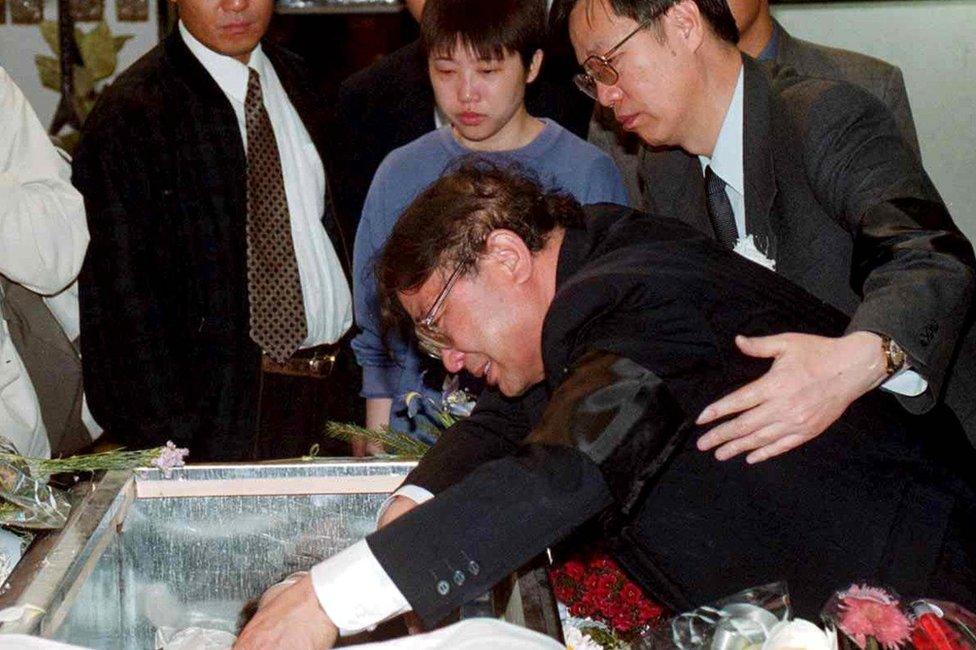
The father of Zhu Ying weeps over her coffin in Belgrade

It would take more than a month for the US to give Beijing a full explanation: that a series of basic errors had led to five GPS-guided bombs striking China's embassy - including one that hurtled through the roof of the ambassador's residence next to the main building but didn't explode, likely sparing his life.
The real target, officials said, was the headquarters of the Yugoslav Federal Directorate for Supply and Procurement (FDSP) - a state agency that imported and exported defence equipment. The grey office building is still there today - hundreds of metres down the road from the embassy site.
Nato had initially hoped the bombing campaign would only last a few days until Milosevic gave up, pulled his forces out of Kosovo and allowed peacekeepers in. But by the time the embassy was hit it had stretched to more than six weeks. In the rush to find hundreds of new targets to sustain the aerial assault, the CIA, which was not normally involved in target-picking, had decided the FDSP should be struck.
But America's premier intelligence agency said it had used a bad map.
"In simple terms, one of our planes attacked the wrong target because the bombing instructions were based on an outdated map," US defence secretary William Cohen said two days after the bombing. He was referring to a US government map that apparently did not show the correct location of the Chinese embassy nor the FDSP.
All US intelligence officers had was an address for the FDSP - 2 Bulevar Umetnosti - and a basic military navigation technique was used to approximate its co-ordinates. The technique used was so imprecise, CIA chief George Tenet later said, that it should never have been used to pick out a target for aerial bombing.



To compound the initial error, Tenet said, intelligence and military databases used to cross-check targets did not have the embassy's new location listed, despite the fact that many US diplomats had actually been inside the building.
Had anyone on the ground visited the site to be bombed they would have found a gated compound, a five-storey building with a green-tiled oriental sloped roof, a bronze plaque announcing the embassy's presence and a large, bright red Chinese flag fluttering more than 10 metres in the air.


The front of the embassy was largely undamaged

The crux of the CIA's explanation was hard for many to believe: the world's most advanced military had bombed a fellow UN Security Council member and one of the most vocal opponents of the Nato air campaign because of a mapping error. China was having none of it. The story, it said, was "not convincing".
"The Chinese government and people cannot accept the conclusion that the bombing was a mistake," the foreign minister told a US envoy sent to Beijing in June 1999 to explain what had happened.
But why would the US intentionally attack China?

It wasn't long after the Sun rose on the morning of Saturday, 8 May 1999, that David Rank, a US diplomat, got out of bed in Beijing.
He turned on the television and switched to CNN. The American news network was carrying live pictures of the smouldering Chinese embassy in pitch-dark Belgrade.
By that afternoon, thousands of irate Chinese protesters would be gathered outside. But Rank, at that stage, was fairly calm. He rang his boss, the head of the political section: "I said, you know, Jim, this is the damndest thing."
The diplomat rushed from his residence to the embassy down the road, where US officials were trying to figure out what had happened. Something had clearly gone wrong but this must have been, had to have been, a tragic mistake.
"It was so patently obvious that it was a sort of fog of war accident… At that point I didn't think that down the road this was going to be a major problem. Obviously, it was a major problem, but not the sort of convulsive incident that it turned out to be," said Rank.
But in the next hours, the shape of how the Chinese government and people would respond started to become clear.

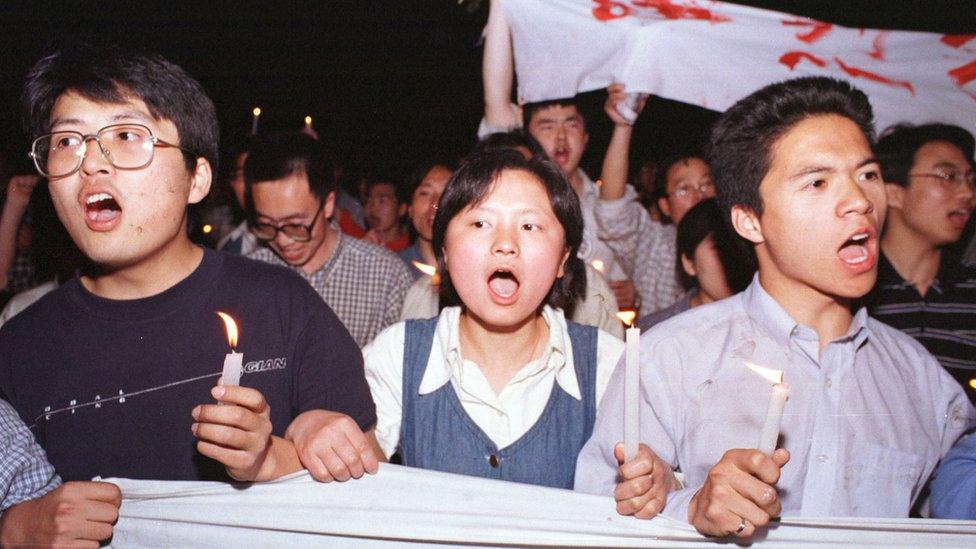

Rank began receiving calls from liberal Chinese friends who were outraged at the bombing. American journalists got similar calls from Chinese contacts with pro-US views, expressing shock and a sense of betrayal.
Chinese state media was already laying out a clear narrative - the US had breached international law by bombing a Chinese diplomatic outpost. "The language that I heard from lots and lots of Chinese, it was identical. It was the same almost word-for-word lines of real anger," said Rank.
By that afternoon thousands of students were streaming onto the streets of Beijing. They gathered outside the embassy and things quickly turned violent.
"They were pulling up the paving stones. Beijing sidewalks aren't paved, they have big tiles and they were pulling those up and smashing them and throwing them over the walls."

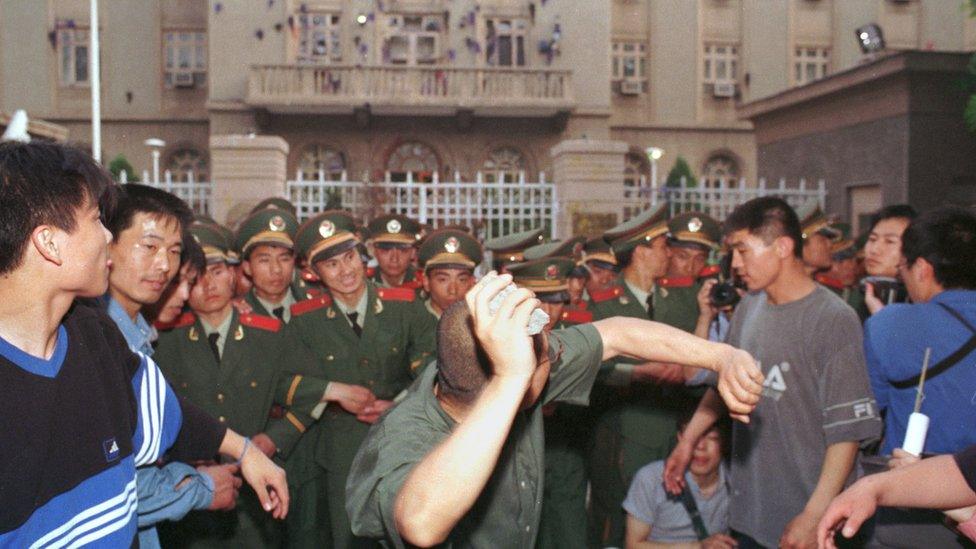

Many of those bits of concrete were crashing through the windows of a building where more than a dozen embassy staff, including US Ambassador James Sasser, had hunkered down. Embassy cars were being defaced and attacked.
The message was clear: the bombing was intentional and, as one slogan went, "the blood of Chinese must be repaid". The protests would continue the next day, with even more people - some reports said 100,000 - storming the diplomatic district, and pelting stones, paint, eggs and concrete at the British and American embassies.
"We feel like we're hostages," Bill Palmer, an embassy spokesman trapped in one of the buildings, said at the time.
Demonstrations of this scale had not been seen in tightly-controlled China in the decade since students led a pro-democracy uprising in Beijing's Tiananmen Square in 1989. This time the anger was directed away from the Communist Party but, with the 10th anniversary of the crackdown on students in Tiananmen approaching, the government had to strike a balance between giving vent to public anger and remaining in control.
In a rare TV address Vice-President Hu Jintao endorsed the protests but also warned they had to remain "in accordance with the law".

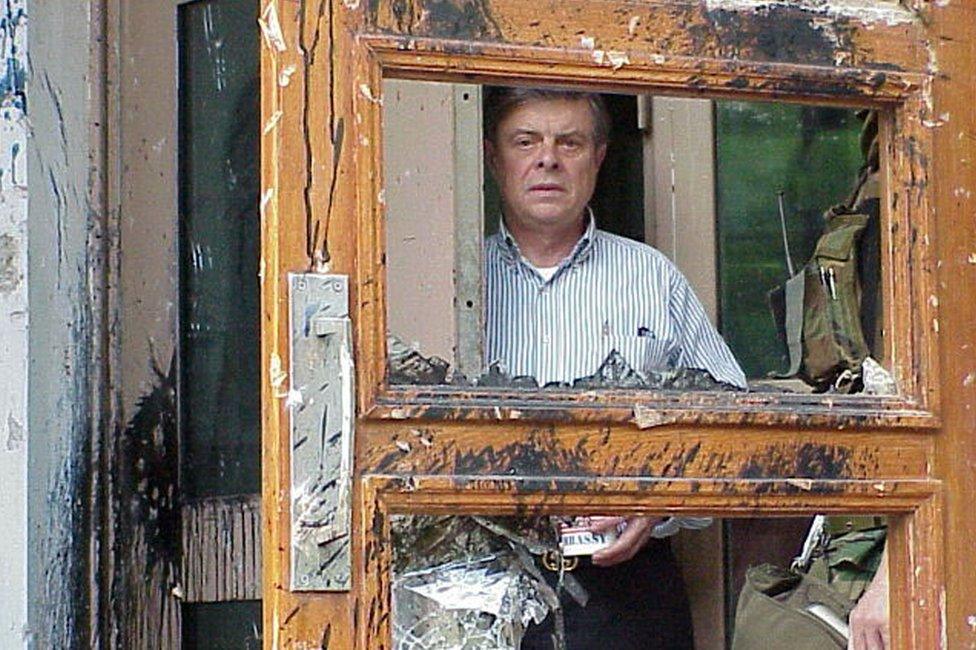
US Ambassador James Sasser was trapped in the embassy for four days as protests raged

The uproar was not isolated to Beijing. Crowds also took to the streets of Shanghai and other cities that weekend. In central Chengdu, the US consul's residence was set alight.
Weiping Qin, a then 19-year-old student leader at the maritime college in southern Guangzhou city, said demonstrators were not informed that Nato had already apologised for what it said was an accident. "The government was hiding this important message. They didn't tell us - so young people, everybody, felt angry. We just wanted to go in the streets and protest against the United States."
He said that initially students at his college were told they had to stay in their dormitories. But 24 hours after the bombing, the university leadership told him that they needed 30,000 students in the streets around the US consulate - 500 of whom would come from the maritime college.
The fired-up students drew lots to choose who could attend. They were loaded onto buses and given statements to read that echoed the stilted official language being broadcast by state media. "They gave us long sentences. But in the street, to speak out in long sentences is very hard." He decided to yell slogans about the evils of Nato and the US instead.

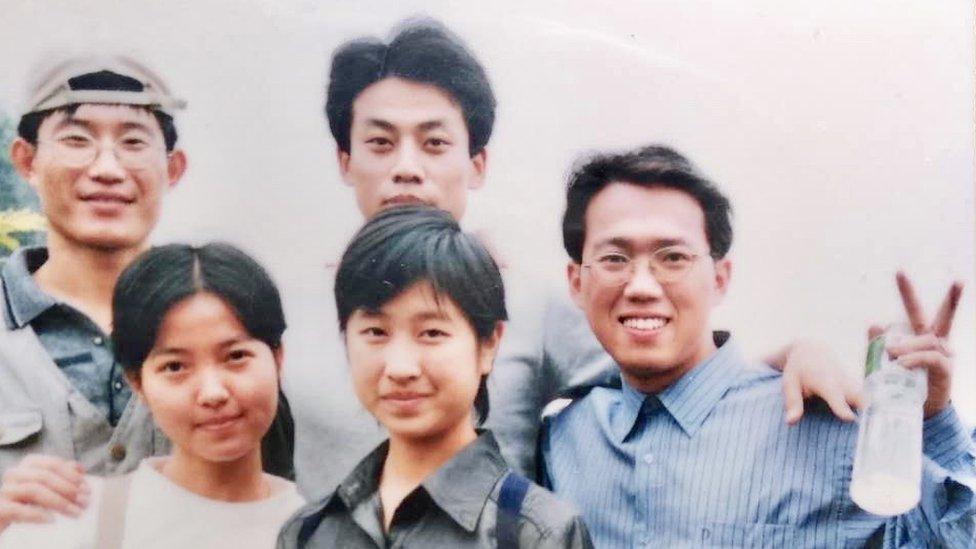
Weiping Qin (right) was a student leader at Guangzhou Maritime College in 1999

"We were just young people and we just felt angry. Our emotions came out like a wave," said Qin, who now lives in the US and criticises the Chinese government in YouTube videos.
David Rank agreed that the anger was genuine. "I think it would really sell the Chinese people short to say this was manufactured by the system," he said. "There was real outrage."
Since the early 1990s, China had embarked on a concerted campaign to instil nationalism and "patriotic education" in its people. The narrative pushed in school textbooks, university classrooms and the media was that China - home to a great and benevolent civilisation - had been subjugated and humiliated at the hands of Western powers. The Belgrade embassy bombing fit the story.
"The anger that ordinary Chinese felt I think can only be understood in that historical context, being socialised to resent the West," said Peter Gries, a professor of Chinese politics at Manchester University and an expert on Chinese nationalism.
For Liu Mingfu - a retired People's Liberation Army colonel known for his hardline views of the US - the embassy bombing was part of a series of events that proved the US was engaged in a "new Cold War against China".
"It was totally intentional. It was a purposeful, planned bombing, rather than an accident," he said.
China would receive $28m in compensation from the US for the bombing, but had to give back close to $3m for the damage to US diplomatic property in Beijing and elsewhere. The US paid another $4.5m to the families of the dead and injured.

On the day of the bombing, Dusan Janjic, an academic and advocate for ethnic reconciliation in Yugoslavia, was having lunch at an upscale restaurant in central Belgrade with a man he considered a good friend.
Ren Baokai was the military attaché at the Chinese embassy and Janjic said he was surprisingly open with him about the fact that China was spying on Nato and US operations and tracking warplanes from its Belgrade outpost. The attaché invited him to dinner at the embassy that night because he knew he liked Chinese food.
"And I started making jokes. 'Come on, you're going to be bombed! I'm not coming!'," Janjic recalled. He was being facetious: he did not actually think the embassy would be hit.
But Janjic couldn't make it to dinner and that evening, when the missiles flew into the building, Ren was thrown to the ceiling by the blast and then fell through a crater left by a bomb. He was found in the basement in a coma only the next morning.

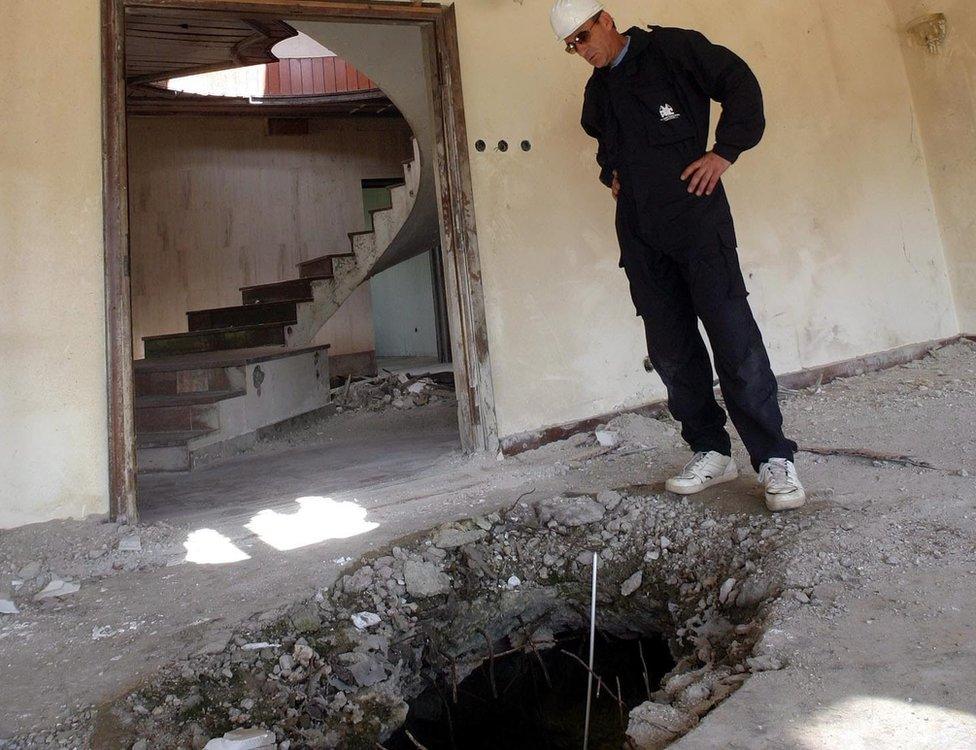
Five bombs hit the embassy compound and one did not explode

Five months after the strikes, in October 1999, two newspapers - Britain's Observer and Denmark's Politiken - suggested that activities overseen by the military attaché might have prompted an intentional US bombing, external.
Citing Nato sources, they reported that the embassy was being used as a rebroadcast station for Yugoslav army communications and was as a result removed from a prohibited target list. US Secretary of State Madeleine Albright decried the story as "balderdash", while British Foreign Secretary Robin Cook said there was "not a single shred of evidence" to support it.
But two decades later, Jens Holsoe, Politiken's correspondent in the Balkans from 1995 to 2004, and John Sweeney, formerly of the Observer and now with the BBC, said they stood by their reporting that the bombing was intentional.
Holsoe said what made him investigate in the first place was CIA Chief George Tenet publicly saying that satellite images gave no indication the target was an embassy - "no flags, no seals, no clear markings" - when in fact all three were present.
One of his sources - a very senior Danish military figure - almost went on the record to confirm publicly that the bombing was intentional, he said. "Then he suddenly backed out and said if he uttered another word to me about this story that not only did he risk being fired but also prosecuted."
Holsoe said it was clear at the time that there was military co-operation between Serb forces and the Chinese - and that he personally saw military vehicles entering and exiting the Chinese embassy. American officials told the New York Times that after the bombing they learned the embassy was China's most significant intelligence collection platform in Europe.
"This was, and always will be, a murky story," said Sweeney.
Ren Baokai survived and was later given the rank of general. He declined an interview with the BBC, saying he was now retired.
The Chinese ambassador who narrowly survived the strike, Pan Zhanlin, denied in a book that the embassy had been used for re-broadcasting and that China, in exchange, had been given parts of the US F-117 stealth fighter jet that Serbian forces had shot down in the early stages of the Nato campaign.

I think it's complete nonsense - it was a bad map-reading error and a bad mistake.

It's widely assumed that China did get hold of pieces of the plane to study its technology. It's also been speculated that China was using the Nato air campaign to test technology to track stealth bombers that are normally undetectable.
But even if all these stories are true - the question remains: would the US really take the risk of bombing a Chinese embassy on purpose?
Even among ex-Yugoslav insiders there is no consensus. One former military intelligence officer told the BBC he believed the bombing was intentional and that the CIA's explanation was ludicrous; while another, a retired colonel, said he believed America's story.
"When something bad happens everybody thinks there has to be a secret reason - not a cock-up but a conspiracy," said the former Nato spokesman Jamie Shea. "I think it's complete nonsense - it was a bad map-reading error and a bad mistake."

On a sunny day in late April, more than a dozen fresh bouquets were stacked up neatly against the memorial stone, but Shen Hong still felt compelled to re-arrange them. He comes to the site of the embassy bombing regularly, to remember his friends that died. But these days, it's rare that he is alone.
Busloads of Chinese tourists arrive every day to gaze at the memorial and the statue of the Chinese sage and philosopher Confucius that now stands nearby.
A young Chinese couple, Zhang and He, were in Belgrade for their honeymoon and decided to visit the memorial. They are around the same age that Xu Xinghu and Zhu Ying were when they were killed in 1999. "Three of our countrymen died here. We knew about this since we were kids and we came to see it," said He.
Yang, a guide who was leading some 30 middle-aged Chinese tourists on a two-week bus tour through the Balkans, said the embassy site was a mandatory stop. "Our embassy was destroyed by Americans. Every Chinese knows this."


The embassy site is being turned into one of the largest Chinese cultural centres in Europe

In 1999, China was not the economic, technological and military giant it is now. It was focused on getting wealthy and had a much less visible foreign policy. But 20 years later the country knows it sits at the top table with America and its ambitions around the world reflect that.
The Belgrade embassy site is being turned into a Chinese cultural centre that will be one of the biggest in Europe. The symbolism is hard to miss: a site of national humiliation and tragedy at the hands of the West re-born as a shiny edifice to China's glorious history.
It's a sign that Beijing has no plans to forget a bombing that allows it to paint the US as an imperialist superpower looking to hurt China. Diplomats who have served in Beijing say the incident is still brought up regularly in conversations.

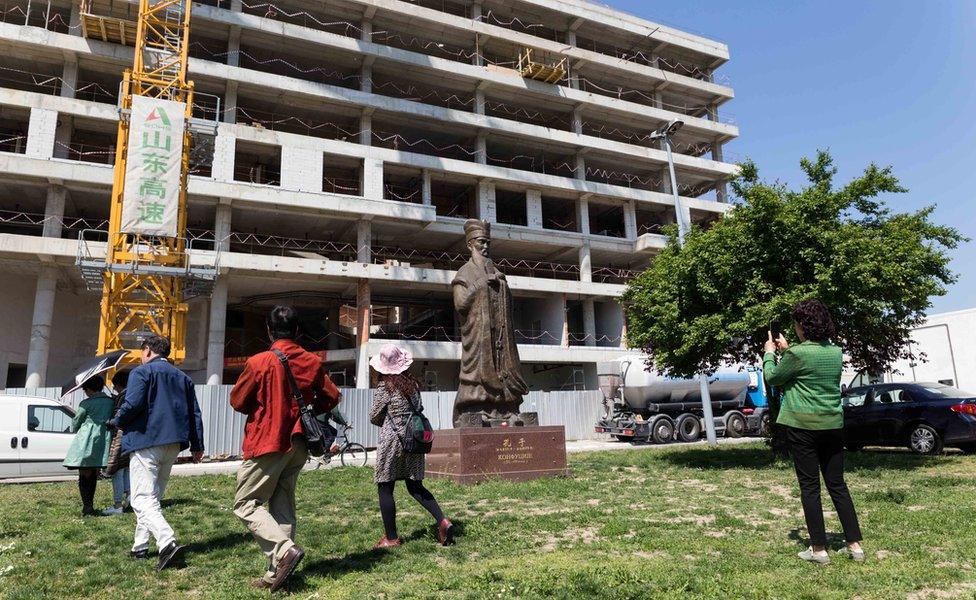

But even those who called for immediate retaliation in 1999 now realise it was fortunate that China's reaction did not spiral out of control: no Americans were killed during the protests and the compensation agreement allowed Beijing to draw a line - if a thin one - under the incident.
"We were the fastest developing country, every year our economy grew by double-digits. And if we would have stopped that because of war back then, we would have lost a lot," said Shen, as another group of tourists arrived at the memorial.
"By nature, I'm a radical. I am always more for war than for a conversation. But when I look back, they did a good thing. Because now we can sit equally with the Americans."

Additional research by Ellen Jin.
- Published24 March 2019

- Published25 March 2019
